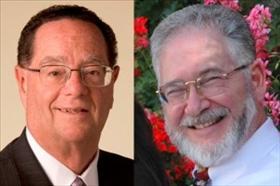Religion and State Index 2013
2013: The year that Religion and State finally took center stage
Hiddush Chair Stanley Gold and CEO Rabbi Uri Regev introduce the 2013 Religion and State Index, highlighting some of the most fascinating religion and state trends in Israel.
Stanley P. Gold 09/09/2013 12:34
Tags: Religion and State Index · freedom of religion · freedom of marriage · non-Orthodox rabbis · civil marriage

Stanley Gold and Uri Regev
Hiddush- Freedom of Religion for Israel is proud to publish the 2013 Religion and State Index. The Religion and State Index is the most comprehensive annual public opinion survey on religion and state issues in Israel. Hiddush conducts the survey through the Rafi Smith Polling Institute each summer and it is traditionally published on the eve of Rosh Hashanah. This is the 5th issue of the Index. In the past four years, the Index received great attention; coverage from the media, opinion-molders, and was actively used by policymakers. It is of the utmost importance, we believe, for this crucial information to make its way to communities, leaders and organizations in Israel and around the world. In the past three years, the Index was published in partnership with the Israel's leading online news site, Ynetnews.
This is the first index to be published since the creation of the Netanyahu-Lapid-Bennett government. All previous indices reported that a majority of Israelis opposed the excessive influence of ultra-Orthodox parties on religion and state policies in Israel and supported a government coalition without them. In the last Index, two-thirds of Israeli Jews said that the ultra-Orthodox parties' political activities distance Israelis from Judaism. The current government, in many ways, came as a result of this sentiment. In the current Index, 64% of Israeli Jews express support for a government coalition without ultra-Orthodox parties in order to prevent them from further influencing Israel's religion and state dynamic.
It's time to think differently
The 2013 Religion and State Index shows a clear and powerful picture of the status of religion and state in Israel today; The Index demonstrates that a consistent majority of Israeli Jews want full religious freedom and equality. The sheer numbers highlight the government's failures in not promoting these goals, and indicate the disappointment towards political parties that claimed to represent the desires of many Israelis but fail to do so when it comes to policymaking.
We hope that in the coming year more support for this critically important agenda will come from Jewish organizations and leaders in the Diaspora.
This year's Index challenges many of the perceived conventions that we have become accustomed to in Israel in past years. Many of us have heard Israeli friends or family say that "Even if I had the option, I would still get married in an Orthodox ceremony." But it turns out this sentiment is no longer true: Two-thirds of secular Israelis and close to 40% of all Israeli Jews would choose an alternative marriage if given the option and would not get married through the Orthodox Chief Rabbinate, which holds a monopoly over matters of marriage and divorce of all Jews in Israel .
Religious pluralism is a principle that is gaining ground among Israelis today. Two-thirds of respondents support equal recognition for rabbis from all denominations, for instance as officiates in weddings, and conversions. Support for the LGBTQ community is also on the rise: 56% of Israeli Jews support same-sex marriage or unions in Israel.
Is the Israeli government doing enough for religious freedom?
This year we are faced with a challenging situation: Even though there are no ultra-Orthodox parties in this current government coalition, 76% of Israelis are still not pleased with the government and Yesh Atid party's actions regarding religion and state. This statistic points to the unfortunate reality that the current government has done very little to promote freedom of religion. 64% of Israeli Jews support public transportation on Shabbat. 62% support recognizing all types of marriages. But since the creation of the new government, it has completely ignored the public's desire and Yesh Atid's promises to institute civil marriage and public transportation on Shabbat. Nor has progress been made with regards to conversions or the growing phenomenon of public exclusion of women rooted in religious extremism.
The findings of the current study are dramatic. There is no doubt that the Israeli public is increasingly losing its patience over the ultra-Orthodox monopoly on Judaism in Israel, and expresses growing demand for freedom of choice in Jewish life. We hope that in the coming year more support for this critically important agenda will come from Jewish organizations and leaders in the Diaspora. Freedom of religion and equality in Israel is not merely an internal Israeli political matter, but one that goes to the heart of Israel -Diaspora relations and the core values of democracy. Fully realizing the goal of “freedom of religion and conscience” as promised in Israel's Declaration of Independence is essential for both Israel's democratic and Jewish character.